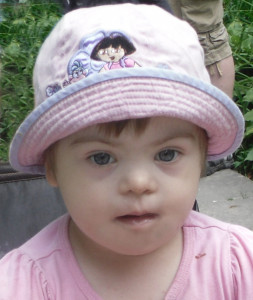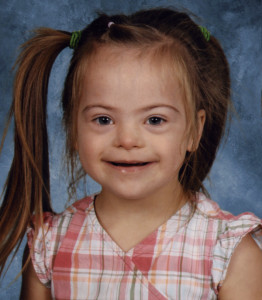Masha will be seven next month. She is in Kindergarten for the second time now. They tell me she is doing much better than last year. She knows the routines, participates in the activities, plays nicely alongside her peers even sharing toys, and is generally a pleasure to have in class. The thing is, she still cannot consistently count to five, name all the basic colors, write anything legible, identify more than 7 letters, or read more than 5 sight words. I don’t need for her teachers to tell me any of this because I see it for myself when I work and play with her. For some unknown reason Masha has a very hard time learning academic things. I noticed it in pre-k and just assumed it was because her brain was too busy learning English, but now I know it is more than that.
 She is a bright child. At age three and a half she was lifted from the life (and language) she knew and dropped into a family across the ocean from her country of birth. You would not believe how fast she learned sign language. And you would not believe how dedicated she was to learning English. That child glued herself to the iPad and played word/item identification games for hours on end. She’d touch a picture, hear the word, and then choose another… over and over and over. When she was tested at age 5 for her entrance to Kindergarten, her understanding of English was high enough that she did not qualify for ESL support. Beyond learning English, she learned how everything works at home and at school. She learned where everything goes and who everything belongs to. That child can sort all of our laundry into seven piles of whose clothes are whose. One morning a couple years ago I woke her up while wearing my husband’s t-shirt that I had grabbed on my way out of bed. Her first word to me that day was “daddy.” I must have looked confused because she reached out and touched the shirt and repeated it. She is also a problem solver. A couple weeks after she came home I saw her trying to jump up and reach a magnetic toy on the fridge. After three unsuccessful tries, she got the broom and knocked it down. She can open any baby gate or door, or carseat latch, and she can handle the iPad independently, often playing her brothers games or finding videos she likes on Youtube.
She is a bright child. At age three and a half she was lifted from the life (and language) she knew and dropped into a family across the ocean from her country of birth. You would not believe how fast she learned sign language. And you would not believe how dedicated she was to learning English. That child glued herself to the iPad and played word/item identification games for hours on end. She’d touch a picture, hear the word, and then choose another… over and over and over. When she was tested at age 5 for her entrance to Kindergarten, her understanding of English was high enough that she did not qualify for ESL support. Beyond learning English, she learned how everything works at home and at school. She learned where everything goes and who everything belongs to. That child can sort all of our laundry into seven piles of whose clothes are whose. One morning a couple years ago I woke her up while wearing my husband’s t-shirt that I had grabbed on my way out of bed. Her first word to me that day was “daddy.” I must have looked confused because she reached out and touched the shirt and repeated it. She is also a problem solver. A couple weeks after she came home I saw her trying to jump up and reach a magnetic toy on the fridge. After three unsuccessful tries, she got the broom and knocked it down. She can open any baby gate or door, or carseat latch, and she can handle the iPad independently, often playing her brothers games or finding videos she likes on Youtube.
What she knows and what she cannot seem to learn mystify me. How can a child memorize hundreds of items of clothing and not be able to memorize 26 letters? How can she clean up around her putting everything in its proper place and struggle with a simple chunky wooden puzzle? I have asked the school psychologist to find out. We want to know how Masha learns best because clearly she has shown that she can learn and apply quite a bit of information, but how we still don’t really understand. Part of me feels like it doesn’t even matter. So what? But the realist in me knows that her independence level in this world depends on her ability to read and understand basic math.
I feel like even talking about this puts me on the wrong side of the “intelligence doesn’t matter” movement. Mainly because I agree that your IQ doesn’t define you or determine your value. I agree that there are multiple types of intelligence, and I agree that lacking intelligence is pretty much a random genetic thing that is all too often used to deny people their rights and freedoms. It also gets a bad rap, as if being born on the wrong side of the IQ scale is an automatic lead in to being the butt of the joke. So much negative comedy is driven off stupid it is buried deep in the consciousness of our culture. With all that agreeing out of the way, I have to say that I still think it matters because it has an effect on a person’s ability to learn certain things that contribute to his or her safety, independence, and wellbeing.
 Safety, independence, and wellbeing… three huge reasons why it is important to find out how best to teach Masha how to process and retain valuable information. Trust me, my motives aren’t ableist. If this world were a Utopia where those lacking keen minds had nothing to fear by being dependent on others, then I wouldn’t give a hoot. I want Masha to be able to recite our adress and phone number not so that I can brag to my FB friends, but rather so that if she gets lost, she can tell someone who she is and how to find her parents. I want her to be able to count money so that she is not easily robbed. I want her to learn about good touch/bad touch and related decision-making so that she is not easily sexually assaulted. The list goes on and on.
Safety, independence, and wellbeing… three huge reasons why it is important to find out how best to teach Masha how to process and retain valuable information. Trust me, my motives aren’t ableist. If this world were a Utopia where those lacking keen minds had nothing to fear by being dependent on others, then I wouldn’t give a hoot. I want Masha to be able to recite our adress and phone number not so that I can brag to my FB friends, but rather so that if she gets lost, she can tell someone who she is and how to find her parents. I want her to be able to count money so that she is not easily robbed. I want her to learn about good touch/bad touch and related decision-making so that she is not easily sexually assaulted. The list goes on and on.
Anyway, when all the testing is done, I hope they have some answers and ideas for us. It is clear that Masha’s education is going to occur outside of the box, and that’s ok. But we have to know what her optimal learning style is so that we can give her what she needs.
Dr. Alberto Costa (who himself has a daughter with DS) has been been researching various medications to assist individuals with DS , with the same goals as you have for your girls in mind — to increase the safety, independence and well-being of individuals with DS. His work is compelling and one of his studies had very promising results:
“It turns out that with vigorous education and support, many people with Down do far better than once thought possible. Medical care of heart and other physical ailments associated with the disorder have likewise achieved significant benefits, doubling the average lifespan from 25 to 49, in just the 14 years between 1983 and 1997.
Still, with an I.Q. that is typically around 50 points lower than average — with some far lower and others, like Tyche, reaching higher — something more than education alone would be necessary to enable the majority of people with Down syndrome to live independently. Costa said he hopes that memantine might be that something, raising I.Q. noticeably, even if modestly. For him, the goal is to help people with Down syndrome achieve autonomy. “At some point, you want your children to have their own life,” he said. “It’s about independence.””
http://www.nytimes.com/2011/07/31/magazine/a-fathers-search-for-a-drug-for-down-syndrome.html?pagewanted=all&_r=0
Also, have you considered having Masha tested for learning disabilities? Auditory processing disorder, dysgraphia, etc are less common (and thus harder to detect) than dyslexia — and lots of interventions, if/when an issue is identified.
I am 100 percent behind you on the safety, independence and wellbeing points!
Everyone has their own learning style. Masha has her own and once we find it, I think she will have enormous growth in her academic learning. Just like when she arrived with her signing and English.